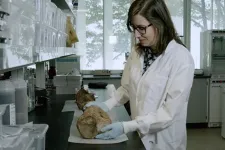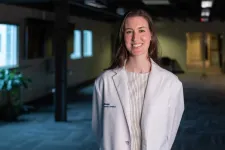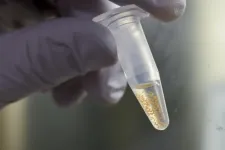(Press-News.org) New evidence published by The BMJ today casts doubt on a much-hyped blood test for the NHS that promises to detect more than 50 types of cancer.
The test, called Galleri, has been hailed as a “ground-breaking and potentially life-saving advance” by its maker, the California biotech company Grail, and the NHS is currently running a £150m Grail-funded trial of the test involving more than 100,000 people in England, report Dr Margaret McCartney and investigative journalist Deborah Cohen.
NHS England claims the test can identify many cancers that “are difficult to diagnose early,” such as head and neck, ovarian, and pancreatic cancers, and that if effective, could be used in a national screening programme.
Trial success would also hand Grail a lucrative deal with the NHS, which, if results are favourable, has agreed to buy millions of tests in exchange for a new state-of-the-art facility built by Grail in the UK. Although contract details remain confidential, a single test in the US currently retails for $950.
But documents leaked to The BMJ suggest that the trial is not suitable to justify a national screening test, while experts believe that Galleri has been over-hyped and that the current trial is unethical.
Even the chair of the UK National Screening Committee has privately voiced “serious concerns” to NHS England’s chief executive about the trial, according to emails seen by The BMJ.
Interim results of the trial have not been published as expected this month. Instead, NHS England said the results were not “compelling enough” and a decision to roll out the test will wait until final trial results in 2026.
But as the trial continues, Freedom of Information requests by The BMJ raise further concerns over the close relationship between key government figures and Grail, including meetings with ex-prime minister Lord Cameron and Nadhim Zahawi, then minister in the Department for Business, Energy and Industrial Strategy.
An NHS England spokesperson said they believed that Grail was “now being subjected to one of the largest and most rigorous investigations done in any health-care system worldwide,” that no decision had been made and no further details were available.
By contrast, an NHS England source, speaking to The BMJ anonymously, said “The clinical or scientific data doesn’t stack up, but that should have come first. This is not the way to do a trial - it should be done transparently. It’s not been thought through at all.”
Added to these concerns, Grail is facing a class action lawsuit in the US. Embittered investors, faced with steep losses, claim the company exaggerated Galleri’s effectiveness in order to increase share price.
Richard Sullivan, director of the Institute of Cancer Policy, King's College London, says that Grail is “a clear-cut case of public risk and private profit.”
Concerns surrounding the decision making process around Grail also serve as a timely reminder to the new Health Secretary, Wes Streeting, whose stated aim is to make the UK a “life sciences and medical technology powerhouse,” note McCartney and Cohen.
“The new government needs a more rigorous and transparent way of reviewing medtech clinical research, especially when it involves such widespread access to NHS resources,” adds Sullivan. “They also need to change their language. It’s all promissory science and hype. This serves no public good whatsoever.”
[Ends]
END
New evidence casts doubt on a much-hyped blood test for early cancer detection
Deal commits NHS to buying millions of tests in exchange for state-of-the-art facility. But experts say test is “a clear-cut case of public risk and private profit”
2024-08-08
ELSE PRESS RELEASES FROM THIS DATE:
Radiotherapy benefits last a decade, breast cancer study reveals
2024-08-08
Providing radiotherapy after surgery could prevent breast cancer from returning in the same place for up to 10 years, a long-term study suggests.
This protective effect is limited after a decade, when the risk of cancer recurrence is similar to that in those who have not received radiotherapy.
The findings provide a more complete picture of the long-term benefits of radiotherapy following breast cancer surgery, experts say.
Surgery followed by radiotherapy remains the standard care for women with ...
Prescription painkiller misuse and addiction are widespread in chronic pain patients
2024-08-08
A new scientific review of 148 studies enrolling over 4.3 million adult chronic pain patients treated with prescription opioid painkillers has found that nearly one in ten patients experiences opioid dependence or opioid use disorder and nearly one in three shows symptoms of dependence and opioid use disorder. This review provides a more accurate -- and more concerning -- rate of opioid misuse than has previously been calculated. It was conducted by researchers at the University of Bristol, funded by the National Institute for ...
When mammoths roamed Vancouver Island: SFU and Royal BC Museum delve into beasts’ history in our region
2024-08-07
Mammoths, the massive pre-historic ice age cousins of the modern-day elephant, have always been understood to have inhabited parts of British Columbia, but the question of when has always been a bit woolly.
Now, a new study from Simon Fraser University has given scientists the clearest picture yet when the giant mammals roamed Vancouver Island.
As part of SFU researcher Laura Termes’ PhD and published earlier this month in the Canadian Journal of Earth Sciences, the study examined 32 suspected mammoth samples collected on Vancouver Island. Of those samples, just 16 ...
Ochsner Health welcomes Mary Claire Curet, MD, as first Ochsner Physician Scholar
2024-08-07
Lafayette, La. – Ochsner Health is excited to announce that Mary Claire Curet, MD, is joining the team at St. Martinville Family Medicine, an Ochsner primary care practice. Dr. Curet, a native of New Iberia, is the first Ochsner Physician Scholar and brings a wealth of knowledge and a deep commitment to her community.
“We are thrilled to welcome Dr. Curet to the Ochsner family,” said Leonardo Seoane, MD, Founding Dean of Xavier Ochsner College of Medicine and Executive Vice President and Chief Academic Officer for Ochsner Health. “Her dedication and passion for primary care, particularly in underserved ...
Discovering how plants make life-and-death decisions
2024-08-07
Researchers at Michigan State University have discovered two proteins that work together to determine the fate of cells in plants facing certain stresses.
Ironically, a key discovery in this finding, published recently in Nature Communications, was made right as the project's leader was getting ready to destress.
Postdoctoral researcher Noelia Pastor-Cantizano was riding a bus to the airport to fly out for vacation, when she decided to share a promising result she had helped gather a day earlier.
“I didn’t want to wait ten days until I came back to send it. It took almost two years to get there,” said Pastor-Cantizano, who then worked ...
National Academies progress report: Health disparities
2024-08-07
Irvine, Calif., Aug. 7, 2024 — From costing society an estimated $11 trillion to hindering new discoveries in medicine and preventing access to effective interventions, underrepresentation of women, older adults and minorities in clinical research has several significant consequences, according to recent analyses commissioned by the National Academies of Sciences, Engineering and Medicine.
Jonathan Watanabe, UC Irvine professor of clinical pharmacy practice and director of the campus’s Center for Data-Driven Drugs Research and Policy, ...
Lemurs use long-term memory, smell, and social cues to find food
2024-08-07
How do foraging animals find their food? A new study by New York University researchers shows that lemurs use smell, social cues, and long-term memory to locate hidden fruit—a combination of factors that may have deep evolutionary roots.
“Our study provides evidence that lemurs can integrate sensory information with ecological and social knowledge, which demonstrates their ability to consider multiple aspects of a problem,” said anthropologist Elena Cunningham, a clinical professor of molecular pathobiology at NYU College of Dentistry and the lead author of the study, published in the International Journal of Primatology.
Animals rely on ...
New research challenges conventional wisdom on wet surface adhesion
2024-08-07
Scientists at the University of Akron and the University of Pittsburgh have overturned long-held assumptions in new research that finds water can be a help for adhesion.
Dr. Ali Dhinojwala, distinguished W. Gerald Austen Endowed Chair and H.A. Morton Professor at The University of Akron’s School of Polymer Science and Polymer Engineering, lead a team whose significant breakthrough — that water can unexpectedly enhance adhesion under controlled conditions — was published Aug. 7 in Science Advances.
The implications of this research are profound, particularly in biomedical applications ...
Newly published report outlines findings from first archaeology project in space
2024-08-07
The first-ever archeological survey in space has provided new insights into how astronauts use and adapt their living space on the International Space Station, which could influence the design of new space stations after the ISS is decommissioned.
Findings from the research team behind the International Space Station Archaeological Project (ISSAP) were published today in the journal PLOS ONE. Archaeologist Justin Walsh of Chapman University is available to discuss the discoveries of the team’s first on-orbit project, the Sampling Quadrangle Assemblages Research Experiment (SQuARE).
While Earth-bound archaeologists dig one-meter squares to understand ...
Memory loss in aging and dementia: Dendritic spine head diameter predicts memory in old age
2024-08-07
BIRMINGHAM, Ala. – Over the course of life, memory fades with varying degrees, robbing older people of the ability to recollect personal experiences. This progressive, nearly inevitable process has long been hypothesized as a consequence of nature’s removal of dendritic spines, a key component of synapses, from brain neurons as they age.
A study published in Science Advances led by researchers at the University of Alabama at Birmingham and Rush University Medical Center, Chicago, Illinois, now provides evidence that the preservation of past life experiences ...
LAST 30 PRESS RELEASES:
Birds change altitude to survive epic journeys across deserts and seas
Here's why you need a backup for the map on your phone
ACS Central Science | Researchers from Insilico Medicine and Lilly publish foundational vision for fully autonomous “Prompt-to-Drug” pharmaceutical R&D
Increasing the number of coronary interventions in patients with acute myocardial infarction does not appear to reduce death rates
Tackling uplift resistance in tall infrastructures sustainably
Novel wireless origami-inspired smart cushioning device for safer logistics
Hidden genetic mismatch, which triples the risk of a life-threatening immune attack after cord blood transplantation
Physical function is a crucial predictor of survival after heart failure
Striking genomic architecture discovered in embryonic reproductive cells before they start developing into sperm and eggs
Screening improves early detection of colorectal cancer
New data on spontaneous coronary artery dissection (SCAD) – a common cause of heart attacks in younger women
How root growth is stimulated by nitrate: Researchers decipher signalling chain
Scientists reveal our best- and worst-case scenarios for a warming Antarctica
Cleaner fish show intelligence typical of mammals
AABNet and partners launch landmark guide on the conservation of African livestock genetic resources and sustainable breeding strategies
Produce hydrogen and oxygen simultaneously from a single atom! Achieve carbon neutrality with an 'All-in-one' single-atom water electrolysis catalyst
Sleep loss linked to higher atrial fibrillation risk in working-age adults
Visible light-driven deracemization of α-aryl ketones synergistically catalyzed by thiophenols and chiral phosphoric acid
Most AI bots lack basic safety disclosures, study finds
How competitive gaming on discord fosters social connections
CU Anschutz School of Medicine receives best ranking in NIH funding in 20 years
Mayo Clinic opens patient information office in Cayman Islands
Phonon lasers unlock ultrabroadband acoustic frequency combs
Babies with an increased likelihood of autism may struggle to settle into deep, restorative sleep, according to a new study from the University of East Anglia.
National Reactor Innovation Center opens Molten Salt Thermophysical Examination Capability at INL
International Progressive MS Alliance awards €6.9 million to three studies researching therapies to address common symptoms of progressive MS
Can your soil’s color predict its health?
Biochar nanomaterials could transform medicine, energy, and climate solutions
Turning waste into power: scientists convert discarded phone batteries and industrial lignin into high-performance sodium battery materials
PhD student maps mysterious upper atmosphere of Uranus for the first time
[Press-News.org] New evidence casts doubt on a much-hyped blood test for early cancer detectionDeal commits NHS to buying millions of tests in exchange for state-of-the-art facility. But experts say test is “a clear-cut case of public risk and private profit”




